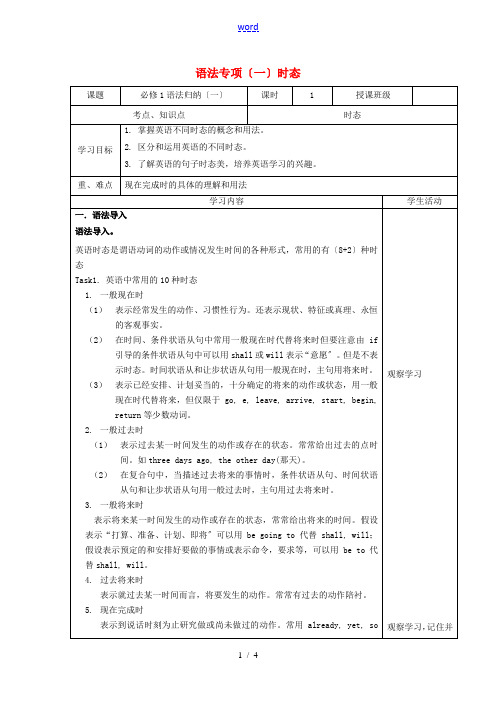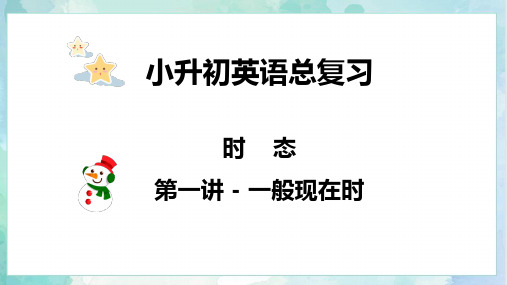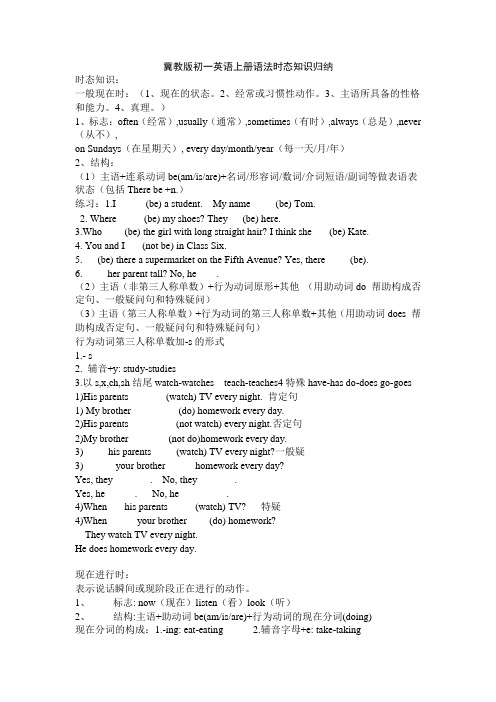1-1时态讲解 (1)
时态讲解——一般现在,现在进行,一般过去,一般将来1

一般现在时态【展示平台】1. 一般现在时态用来表示经常,反复,习惯性发生的动作或存在的状态,常与表示频率的副词sometimes(有时), often(经常), usually(通常), always(总是)等连用。
时间状语in the morning/ afternoon/ evening(在上午/下午/晚上), every day/ week/ month/ year(每天/周/月/年, at noon/night(在中午/夜里), on Monday/Tuesday(在星期一/二)等也可用在一般现在时态中。
如:Bruce usually walks to school. 布鲁斯通常步行去上学。
We have two P.E classes every week. 我们每周上两节体育课。
2. 表示现在的特征或状态。
如:She is always ready to help others. 她总是乐于助人. He is 13 years old. 他13岁了。
3. 表示事实或客观真理,或在谚语中,也用一般现在时。
如:The sun rises in the east and sets in the west every day. 太阳每天东升西落。
When there is a will, there is a way. 有志者,事竟成。
4. 一般现在时的基本句型1)肯定句:①主语+动词原形+其他②主语(第三人称单数)+ 动词-s+ 其他如:They live in China. 他们住在中国。
He likes eating apples. 他喜欢吃苹果。
2)否定句:①主语+don’t+ 动词原形+其他②主语(第三人称单数)+doesn’t+ 动词原形+其他如:They don’t live in China. 他们不住在中国。
He doesn’t like eating apples. 他不喜欢吃苹果。
四川省宜宾市一中高一英语 语法专项(一)时态教学设计-人教版高一全册英语教案

语法专项〔一〕时态far, by now, since two days ago, for a few days, 等词语做状语。
运用。
注意:give, see, e, arrive, leave, begin, start, finish, join, bee, borrow,lend, die, end等点时间动词可以用于完成时,但是在肯定句中不能与表示一段时间的since和for短语连用,因为点时间动词不能够延续,而在否定句中可以与表示一段时间的for短语连用,因为否定的点时间动词可以看做一种可延续的状态。
6.过去完成时表示截止到过去某一时刻或在过去的动作之前已经做或尚未做的动作。
7.现在进行时(1)表示现状正在进行的动作;(2)有时候用现在进行时表一般将来时,表示不久将要发生的动作,主要用于e, go, leave, arrive, start.等动词。
8.过去进行时表示过去某一时刻或过去某一段时间内正在进行的动作;句中常有过去的点时间或过去动作陪衬。
9.现在完成进行时表示从过去某一时间开始,一直延续到现在还在进行的动作。
10.过去完成进行时表示从过去某一时间开始,一直延续到过去的另一时间还在进行的动作。
Task2. 指出以下句子的不同时态1. She regretted telling Jane about her own affairs._____________________2. My neighbor does outdoor exercises every morning. ________________3. When he arrives, I will let you know. ______________________4. The train from Harbin arrives at 5:30 this afternoon.________________5. When are you going to answer them? _____________6. The meeting is to be held next Monday. ____________7. Mike has been here for a year. ____________8. He said he would not e home that day. _______________9.The manager is studying the contract.____________10. She said she would give me a gift when she came again.______________11.The train is leaving in 5 minutes. ______________12. At 9 pm last night, I was watching football on TV.13. You have been working for hours. You should stop to have a rest._________14. When the secretary came in and interrupted us, we had been talkingfor an hour. _______二.重难点探究探究点一:语境中的过去式,往往表示“刚才、刚刚〞之意,暗指现在已经“不再这样〞。
第1讲 时态重点句型

第1讲时态重点句型1.It/Thisisthefirsttimethatsb. hasdone...这是某人第一次做某事It/Thiswasthefirsttimethatsb. haddone...这是某人第一次做某事Itisthefirsttimethathehasperformedonsuchabigstage.这是他第一次在如此大的舞台上表演。
Itwasthethirdtimethathehadbeenoutofworkthatyear.这是他那一年第三次失业。
2.Itis/hasbeen...sincesb. didsth. 自从某人过去做某事以来已经…… (since后接过去时)sb. hasdone sth. since/ever since/sincethen IhaveknownhimeversinceIwasachild.我自孩提时代起就已经认识他了。
Mycomputerbrokedownandmyessayhasbeenleftunfinishedsin ce.我的电脑坏了,我的文章至今还没有写完。
I’vebeenonthegoeversinceeighto’clockthismorning.我从早晨八点钟起就一直忙个不停。
3.It/Thisisthebest (worst,mostinteresting等) thatsb. hasdonesth.ItisthemostinterestingbookthatIhaveeverread.这是我读过的最有趣的一本书。
4.Itwon’tbelongbeforesb. doessth. 不久之后某人将会……(before引导的时间状语从句中用一般现在时代替一般将来时)Itwon’tbelongb eforeweseeeachotheragain.我们不久之后就会见面了。
5.Bythetimesb. doessth. ,sb. willhavedone到……时为止时,某人将已经做了……(bythetime引导的时间状语从句中用一般现在时代替一般将来时) BythetimeIgraduatenextyear,Iwillhavelivedherefor5years.到明年毕业时,我就在这里待了五年了。
动词时态(1)一般时态的构成与用法+课件-2025届高三上学期英语一轮复习专项

一般过去时的用法
② 一般过去时的特殊用法
b. 在口语中,一般过去时往往显示委婉客气。
I wondered if you could give me a hand. 我想请你帮个忙。 Might I come and see you tonight? 我想今晚来看你,好吗?
一般现在时和一般过去时的比较
一般将来时的用法
③表示同意或答应做某事
That bag looks heavy. I'll help you with it. 这个包看起来很重,我来帮你提。 I won't tell anyone what happened, I promise. 我保证不告诉别人所发生的事。
一般将来时的用法
一般将来时的用法
①表示将要发生的动作或存在的状态
I shall be free this afternoon. 我今天下午有空。 There'll be no chemistry classes tomorrow. 明天没有化学课。 They will probably go to Shanghai for their holiday. 他们可能去上海度假。
高中英语动词时态精讲(1)
一般时态的构成与用法
英语中的现在时
在英语中,不同时间发生的动作或存在的状态,要用 不同的动词形式来表示,这就叫做动词的时态。
一般时包括一般现在时、一般过去时、一般将来时和 一般过去将来时。
目录
01
ቤተ መጻሕፍቲ ባይዱ
02
03
04
一般现在时 一般过去时 一般将来时 一般过去将来时
01 一般现在时
一般过去时的用法
① 一般过去时的基本用法
【专项复习】小升初英语课件-专题 04 时态 第一讲 一般现在时 全国通用版

考点三 一般现在时用法
3.用在格言或警句中 e.g. Pride goes before a fall.骄者必败。 4.现在时刻的状态、能力、性格、个性 e.g. Xiao Wang writes good English but does not speak well. 小王的英语书面表达能力好,但口语不好。
teaches washes
goes
cries studies
考点六 解题方法
1. 填空、选择解题两步走
① 找时间标志词,判断时态【一般现在时】 ② 找主语,判断是否需要进行动词变化
考点六 解题方法
2. 句型转换解题技巧
① 含有be 动词以及情态动词的句型转化 肯定句:主语+am/is/are/情态动词+其他.
思路点拨:该题考查动词短语.根据sometimes判断该句为一般现在时,主 语Su Yang是第三人称单数,故谓语动词要变为单三形式.fly的第三人称 单数形式是flies,该句用复数形式kites.故选:B.
例题解析
【例5】 1. His father is a kind man. He often _______(help) others. 2. My brother ________ (play) computer every day. 3. Sometimes Tony __________(have) lunch at home.
考点四 一般现在时句型
1.肯定句: There+ be动词+其他.
There is an apple on the desk.
2.否定句: There + be动词+ not+其他. There isn't an apple on the desk.
冀教版初一英语上册时态语法归纳1

冀教版初一英语上册语法时态知识归纳时态知识:一般现在时:(1、现在的状态。
2、经常或习惯性动作。
3、主语所具备的性格和能力。
4、真理。
)1、标志:often(经常),usually(通常),sometimes(有时),always(总是),never (从不),on Sundays(在星期天), every day/month/year(每一天/月/年)2、结构:(1)主语+连系动词be(am/is/are)+名词/形容词/数词/介词短语/副词等做表语表状态(包括There be +n.)练习:1.I______(be) a student. My name_____(be) Tom.2. Where _____(be) my shoes? They___(be) here.3.Who ____(be) the girl with long straight hair? I think she ___(be) Kate.4. You and I ___(not be) in Class Six.5.___(be) there a supermarket on the Fifth Avenue? Yes, there_____(be).6. ____ her parent tall? No, he____.(2)主语(非第三人称单数)+行为动词原形+其他(用助动词do 帮助构成否定句、一般疑问句和特殊疑问)(3)主语(第三人称单数)+行为动词的第三人称单数+其他(用助动词does 帮助构成否定句、一般疑问句和特殊疑问句)行为动词第三人称单数加-s的形式1.- s2. 辅音+y: study-studies3.以s,x,ch,sh结尾watch-watches teach-teaches4特殊have-has do-does go-goes 1)His parents _______(watch) TV every night. 肯定句1) My brother _________(do) homework every day.2)His parents _________(not watch) every night.否定句2)My brother________(not do)homework every day.3)_____his parents_____(watch) TV every night?一般疑3)______ your brother _____ homework every day?Yes, they _______. No, they _______.Yes, he______. No, he _________.4)When___ his parents _____(watch) TV? 特疑4)When _____ your brother ____(do) homework?They watch TV every night.He does homework every day.现在进行时:表示说话瞬间或现阶段正在进行的动作。
小升初英语讲解时态:一般现在

小升初英语总复习精讲精练之动词时态(1) 一般现在时【精讲】前段时间,我们梳理了小升初英语常考的词法,从今天开始,我们一起看看小升初英语常考的时态。
今天先来复习第一部分:一般现在时。
一般现在时,表示通畅性、规律性、习惯性的动作或状态。
那么在考试中怎样判断句子中应该用什么时态呢?首先我们一起看看一般现在时的关键词。
[关键词]always(总是), often(经常), usually(通常), sometimes(有时), never(从不), every day(每天)/ week(每周)/ month(每个月)/ year(每年), once/ twice/ three times a day / week / month / year(每天/每周/每月/每年一次/两次/三次......)。
如果句子中出现以上关键词,那么这个句子要用一般现在时。
那么一般现在时又有哪些人称之分呢?[人称]1、单三人称:he, she, it以及所有能够用he,she,it所代替的人称。
2、非单三人称:除单三人称以外其他的人称。
为什么在一般现在时中,我们要把人称分为以上两种呢?这也是小升初考试的一个考点,即:在一般现在时中,主语如果是单三人称,谓语动词要在词尾+s或es(动词单三人称的变化规则同名词单数变复数),主语如果是其他人称,谓语动词用原形。
[构成形式]一般现在时的构成形式分为两种:一种是含有be动词,另一种是含有实意动词。
我们一起通过下面两个表格看看这两种形式有什么区别:我们一起看看下面几个例句:1、I drink milk every day. 我每天都喝牛奶。
2、He likes playing tennis.他喜欢打网球。
3、I don’t speak French.我不讲法语。
4、Where is my skirt ?我的裙子在哪里?5、Does he get up early every morning? 他每天都起床很早吗?【精练】一、用括号内所给动词的适当形式填空。
一张图搞懂英语的16个时态

一张图搞懂英语的16个时态| 宝藏秘籍英语时态全解析一说到时态,可能很多高中生就忍不住吐槽:简直就是个磨人的小妖精!面对do,doing,did,done,had done·····一大堆长得差不多的字符,真想一把火把书烧掉!可时态作为英语的基础项,又不能丢在一遍不管不顾。
在语法体系里,时态看起来变来变去很容易混淆,其实只是因为学生的脑子里对时态还没有清晰的理解和差异化分类,在对应的语境里也就不知道该用什么时态。
理清这张图,时态其实也就那么一回事。
1一般现在时(do/does; is/am/are)①表示现在的情况、状态或特征。
例:He is a student.他是一个学生。
②表示经常性、习惯性动作。
例:He always helps others.他总是帮助别人。
③客观事实和普遍真理。
例:The earth moves the sun.地球绕着太阳转。
④表示一个按规定、计划或安排要发生的动作。
仅限于某些表示“来、去、动、停、开始、结束、继续”等的动词,可以与表示未来时间的状语搭配使用。
常见的用法是:飞机、火车、轮船、汽车等定期定点运行的交通方式。
例:The next train leaves at 3 o'clock this afternoon.下一趟火车今天下午3点开车。
⑤在时间、条件和让步状语从句中经常用一般现在(有时也用现在完成时)表示将的来事情。
(即:主将从现原则)例:I will call you as soon as I arrive at the airport.我一到机场就会给你打电话2现在进行时(am/is/are doing)① 表示此时此刻正在发生的事情。
例:He is listning to the music now.他现在正在听音乐。
② 表示目前一段时间内一直在做的事情,但不一定此时此刻正在做。
例:I am studying computer this term.这个学期我一直在学习计算机。
- 1、下载文档前请自行甄别文档内容的完整性,平台不提供额外的编辑、内容补充、找答案等附加服务。
- 2、"仅部分预览"的文档,不可在线预览部分如存在完整性等问题,可反馈申请退款(可完整预览的文档不适用该条件!)。
- 3、如文档侵犯您的权益,请联系客服反馈,我们会尽快为您处理(人工客服工作时间:9:00-18:30)。
时态、语态(主动,被动)一般现在时:do / does; be ( am , is, are)1. He gets up at six every day. He usually goes to work at 7 o’clock every morning.She takes exercise every morning.The old couple often/usually/always/sometimes play mahjong every night.He is always a good listener.2. The sun rises in the east and sets in the west. Shanghai lies in the east of China.The earth moves around the sun. All rivers run into the sea.Knowledge is power. Practice makes perfect. Pride goes before a fall.The teacher told me that the earth goes around the sun.3. If it is sunny tomorrow, we will go hiking.If he accepts the job, he will get more money soon.A dog will not howl if you beat it with a bone.So long as he works hard, he will succeed one day.The harder you study, the better results you will get.一般过去时:did / was, were1) I saw her yesterday. He was born in October.She won the competition last week. They became good friends 3 days ago/ a few days ago.It happened many years ago. The movie was on in 2002.My parents worked in Xiamen in the past.I heard that the peasants here were very poor in the past.The year 2002 saw the great changes in Shanghai.Oh, I didn’t know you were here. I thought you were in America.He lived in Beijing when he was young.The last time I saw Jane, she was picking cotton in the fields.He checked the evidence, read the article and passed it on to the editor.2) I used to smoke a lot. They used to quarrel.区别: He used to get up early.He is used to getting up early. He has got used to getting up early.常考: It is (high/ about) time that sb/sth did/ should do sth.It is (high/about) time that the government should take measures to prevent the air pollution.It is (high/about) time that the government took measures to prevent the air pollution.一般将来时1. will doIt will be sunning tomorrow.I will buy a computer next week. She will examine next Sunday. 检查身体They will go to Shanghai in an hour. The man will set off for Paris.I will be happy if you pass the exam.We will begin our class as soon as/the moment/ immediately/ instantly/ the instantthe teacher comes.Use your head and you will find a way. Hurry up or you will be late.What shall we do if he doesn’t come?will+动词原形有时表示一种倾向性或惯性的动作。
Oil will float on water. This machine won’t work.What is the matter with the pen? The ink won’t come out.2. am/ is/ are going to doI am going to go abroad.She is going to attend a international meeting next week.They are going to talk about how to deal with the problem.You are going to find the mistakes in the composition.3. am / is / are about to doBe quiet. The concert is about to start. Don’t leave. Li Lei is about to come.Look! The race is about to start. I was about to explain when she came.Ladies and gentlemen, you are about to hear the most incredible tale.He is about to break down if he continues to work this way.4. am /is / are to doI am to take care of my parents 10 years later. She is to go to Beijing.They are to hold a conference. The President Xi is to visit the poor in the district next week. No one is to leave the cinema without the police’s permission.5. The new school year begins on September 1.既定的时间如生日、日历、课时安排、交通时刻等,一般用现在时表将来。
The bus comes / arrives/ leaves/starts/ begins in 10 minutes.The train starts at 7:00. Don’t hurry. The meeting starts at a quarter past eight.The bus goes back at four thirty.The bus is coming/ arriving/ leaving/starting. in 5 minutes.Ladies and gentlemen, please fasten your seat belts. The plane is taking off .The talent show is coming in a few weeks. The dog is dying.Hurry up. The shop is closing. Mary is leaving on Friday.过去将来时1.He said he would come, but he didn’t. She said she would go home.2.They said that they were going to settle the problems for the customers.3.He was about to leave the office when the telephone rang.4.He said he was to pay a visit to Tibet during summer vacation.现在进行时1.We are having English class.They are talking about the coming summer vacation now.I am waiting for an important call from my boss in Shanghai.Come to me early tomorrow. If I am still sleeping, wake me up.The workers are building a new bridge across the river.2.We are learning how to write in English this term/ this week/ this month/ this year.Teenagers are damaging their health because they play computer games too much.Mary is studying at college. It is getting colder and colder.3.Jack is always telling lies. Mary is always cheating in English exams.He is always dealing with difficulties easily. The boy is always making trouble.He is always doing good deeds.过去进行时1.I was doing my homework at nine last night.What were you doing at nine last night ?When the telephone rang, I was sleeping.The telephone was ringing, but by the time I got indoors it stopped.-Can you answer the question? -Oh, sorry. I was not listening carefully just now.2. She didn’t want her parents to know what she was doing this week.I was wondering if you can do me a favour.I was helping my mother in the kitchen all day yesterday.3. Your son was always coming late to school.She was always helping other when he lived here.Joan was always complaining about her busy job.4.Unfortunately, when I got there, she was just leaving, so we had only time for a few minutes.-It was really kind of you to give me a lift home.- Oh, don’t mention it. I was coming past your house anyway.将来进行时At this time tomorrow, we will be flying over the Atlantic.I will be doing my homework this time tomorrow.We will be taking a exam next week.The President will be meeting the foreign delegation at the airport.现在完成时1.I am not upset now because I have achieved my goals常见标志词just, already, yet , ever, recently, so far , up to now, since+过去的时间in the past few years/months/weeks/days, in the past 3 days,over the past few years, during the last 3 monthsThe old couple have been married for 40 years, and they have never quarreled so far.They have lived in Beijing for 5 years. I have learned English for 10 years.They have lived in Beijing since 1995.I have been to Beijing. I have gone to Beijing.Have you ever been to Beijing? I have never seen such an interesting film before.This is the first time that I have visited China.This is the most interesting film that I have ever seen.That is the only book that he has written.过去完成时By the end of last term we had finished the book.He said his first teacher had died at least 10 years before.There had been 25 parks in our city up till 2000. They finished earlier than we had expected. They became friends again that day. Until then they hadn’t spoken to each other for two year.He had cleaned the room before he slept. The train had already left before we arrived.考点:1) I had hardly finished my work when he came to see me.=Hardly had I finished my work when he came to see me.2) I had no sooner got into the room than it began to snow.=No sooner had I got into the room than it began to snow.3)That/ It was the second time that she had been her grandfather.将来完成时By the end of next month, he will have travelled 1000 miles on foot.By the time you reach the station, the train will have left.By next Tuesday, I will have got ready for the exams.By the end of next March we will have accomplished all these projects.现在完成进行时It has been raining for 3 days.People have been enjoying the convenience of big cities.Mother has been shouldering all the homework since her marriage to father.Now that she is fired, Mrs.Brown has been considering going back to school, but she hasn’t decided yet.How long have you been waiting?The police have been looking into the matter, but haven’t drawn a conclusion yet.过去完成进行时I had been looking for it for days before I found it.I had only been reading a few minutes when he came in.I had been sleeping when my friend telephoned me.They had only been waiting for the bus a few moments when it came.He had been thinking about his marriage before he made the decision.She had been suffering from a bad cold when she took the exam.Rafael was scolded even if he hadn’t been doing anything wrong.He came back at seven. He had been waiting for her two hours. (at seven he didn’t wait any more) He stopped swimming. He had been swimming for the last 3 hours.区别:1. Last week she promised to help me. She has promised to help me.Mr. Black lived in China in the 1990s. Mr. Black has lived in China for ten years.2. They have repaired the road. They have been repairing the road.时态区别一、现在进行时与一般现在时的区别(1) 现在进行时强调目前正在进行的动作,而一般现在时强调经常性或习惯性的动作。
